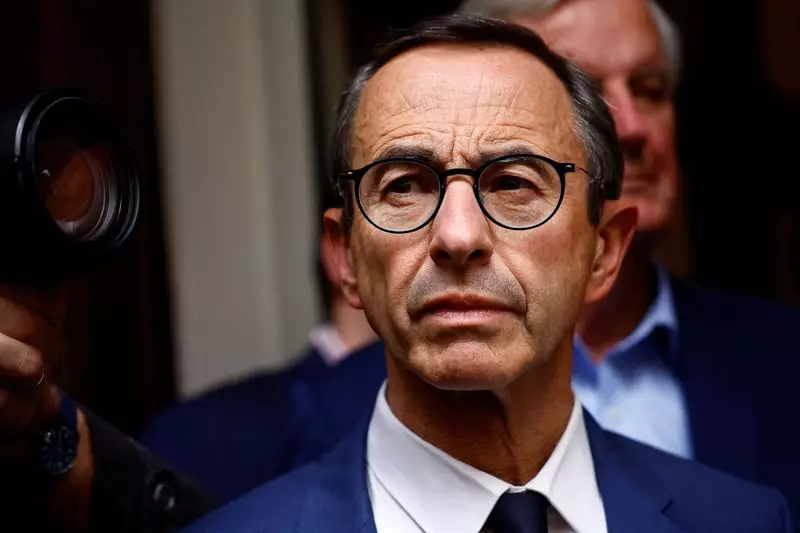In the wake of a fresh cabinet overhaul, President Emmanuel Macron’s recent ministerial appointments have drawn significant attention and scrutiny. Appointing a mix of seasoned politicians and fresh faces, Macron aims to navigate the complex dynamics of French politics while addressing ongoing economic and social challenges. The choice of ministers not only reflects Macron’s strategic positioning but also highlights the broader shifts within the political landscape of France.
At just 33 years old, Antoine Armand embodies the blend of youth and ambition that Macron has championed since his election. A relative newcomer, Armand was first elected to parliament in 2022 and has quickly ascended through the ranks, recently named the Minister of Finance and Economics. His background as a finance inspector and a graduate of the prestigious École Nationale d’Administration positions him well for the complexities of fiscal governance.
Armand’s appointment comes at a crucial juncture as France grapples with mounting budgetary pressures and an urgent need for economic reform. With Laurent Saint-Martin assisting on budgetary matters, the ministry faces the dual challenge of addressing a rising budget deficit while contemplating sensitive issues like tax increases and spending cuts. Stakeholders will be closely watching to see if Armand can translate his academic credentials and political intellect into effective policy responses that resonate with the public amid austerity concerns.
For many, the inclusion of Bruno Retailleau, a veteran senator known for his hard-right stance, marks a pivotal shift in the ideological composition of the cabinet. Appointed as Interior Minister, Retailleau brings with him years of political experience and a reputation for advocating tough immigration policies. His ascent within Macron’s administration illustrates the ongoing polarization in French politics, where both left and right factions are vying for influence.
Retailleau’s criticism of Macron’s current immigration efforts hints at potential friction within the cabinet. By proposing constitutional changes to cut welfare benefits and increase police presence against protestors, he signals a more hardline approach that could surface internal debates surrounding civil rights and the government’s approach to social justice. This tension within the cabinet could either help consolidate a stronger right-leaning strategy or exacerbate divisions within the government.
Jean-Noel Barrot’s promotion to Foreign Minister illustrates Macron’s commitment to maintaining a centrist equilibrium within his cabinet. Coming from a family of seasoned politicians, Barrot’s political lineage adds a historical depth to his role. His prior experience as a junior minister for European affairs and his involvement in digital policy provides him with a well-rounded perspective on both national and international issues.
As global diplomacy increasingly impacts European security and economic stability, Barrot’s ability to navigate complex international relations will be critical. His centrist approach and established connections could facilitate vital negotiations, especially in an era characterized by geopolitical tensions and the need for concerted European responses.
Benjamin Haddad, now serving as the Minister for Europe, represents the new generation of French politicians with a global viewpoint. His fluency in English and previous experiences in Washington, D.C. prepare him for engaging with international partners, particularly in relation to European Union dynamics and transatlantic relations.
Haddad’s proactive stance on the war in Ukraine showcases his diplomatic strengths as he rallies support for crucial initiatives. His ability to bridge the divide between French domestic policy and European strategic objectives will be essential for Macron’s vision of a unified and resilient Europe.
Lastly, Sebastien Lecornu’s retention as Defence Minister suggests a blend of continuity and stability in a critical government sector. A loyal ally of Macron’s administration since rising through the ranks in 2017, Lecornu’s experience is vital for navigating ongoing security challenges, including those posed by international threats and domestic unrest.
His low-profile approach may belied an effective management style steeped in strategic prudence. As global security issues continually evolve, Lecornu’s role will be pivotal in aligning France’s defence strategies with broader European and NATO initiatives.
Macron’s new cabinet reflects a complex tapestry of experiences, ideologies, and ambitions, crafting a government tasked with addressing pressing national issues. The diverse backgrounds of ministers, from economic reform to hardline immigration policies, suggest a cabinet not without its internal tensions. How effectively these leaders collaborate and transform political capital into actionable policies will ultimately define the success of Macron’s administration in a rapidly changing political environment. As such, the coming months will be critical for analyzers keen on observing the impact of these appointments.

